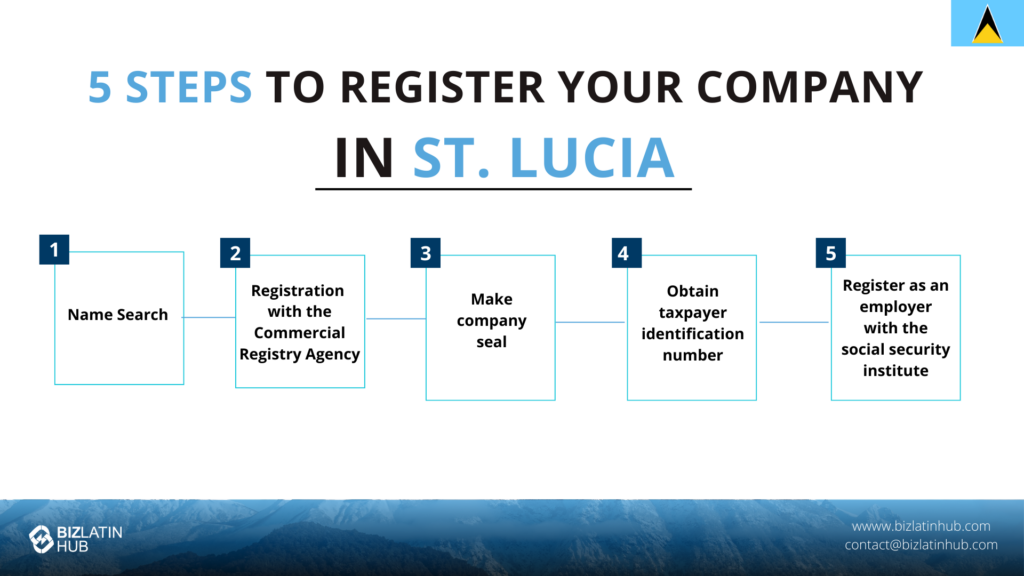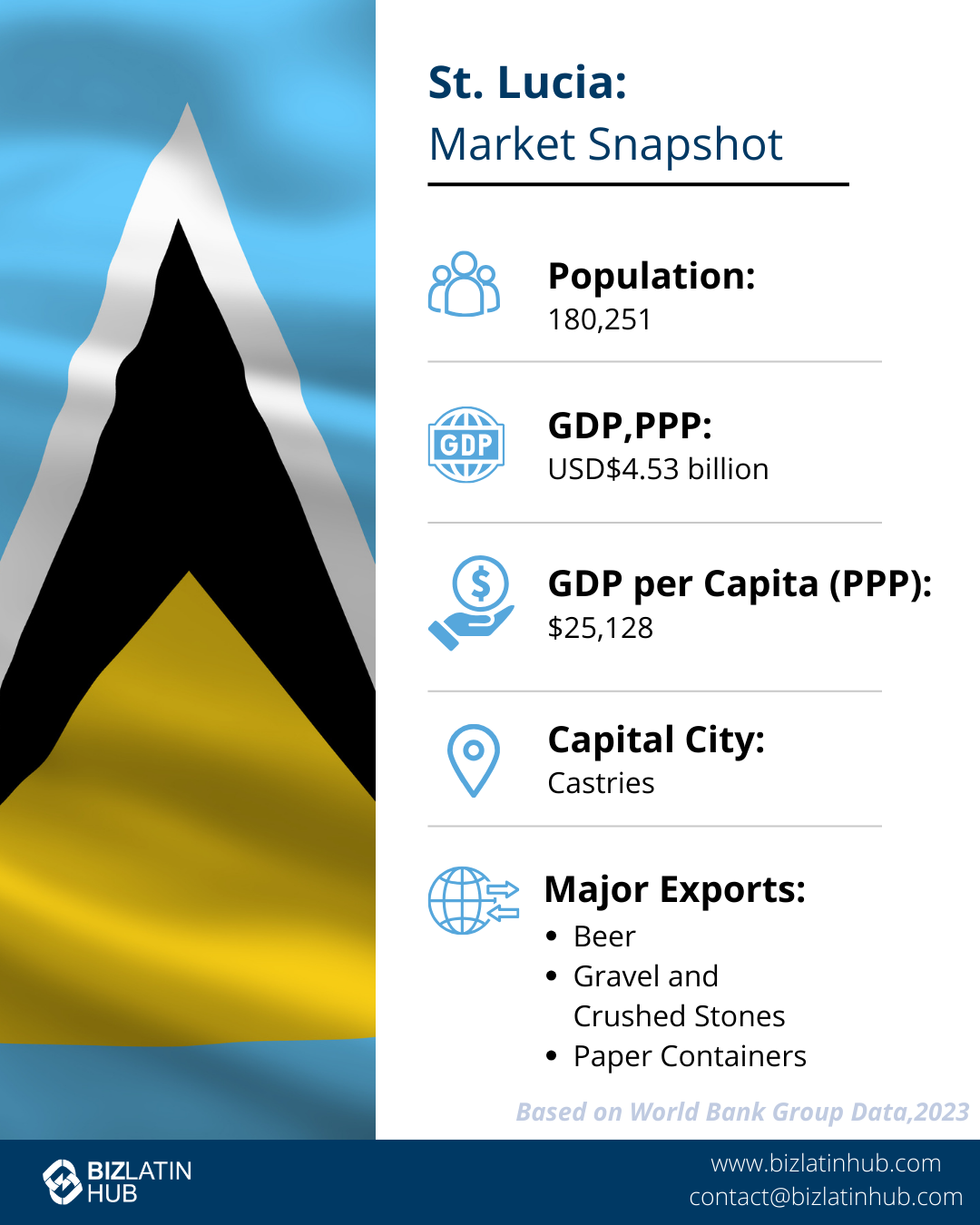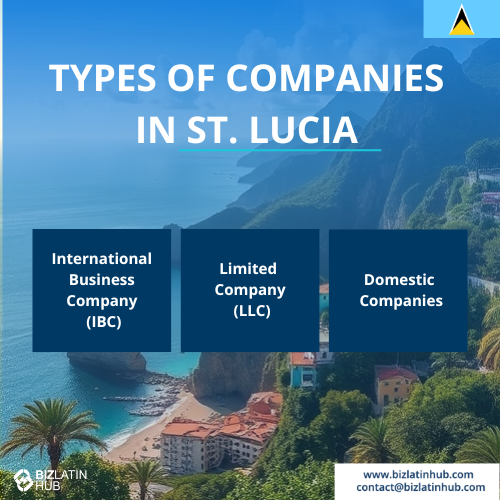Company formation in St. Lucia combines the island’s natural beauty, favorable business climate, and financial benefits. Opportunities in St. Lucia include attractive tax incentives, including exemptions, tax holidays, and low corporate rates, boosting profitability and competitiveness. Establishing a business here unlocks significant financial advantages and leverages a supportive environment. At Biz Latin Hub, we specialize in the Caribbean and Latin America, ensuring a smooth and efficient setup process. This guide focuses on the International Business Company (IBC), the preferred structure for foreign investors conducting business outside of Saint Lucia.
Key Takeaways On Company Formation in St. Lucia
| Is Foreign Ownership Permitted? | 100% foreign ownership is availble. |
| Steps to Incorporate a Company in St. Lucia: | Step 1 – Name Search. Step 2 – Registration with the Commercial Registry Agency. Step 3 – Make company seal. Step 4 – Obtain taxpayer identification number. Step 5 – Register as an employer with the social security institute. |
| What Are The Common Entity Types? | International Business Company (IBC) |
| What is the difference between a Domestic Company and an IBC? | The former can operate in St Lucia, the latter cannot. |
| Why Choose Company Formation in St. Lucia? | A favourable business enviroment with international links means company registration in St. Luica exposes investors to great opportunities. |
5 Steps guide to company formation in St. Lucia:
Here are the 5 steps to form a company in St. Lucia:
- Step 1 – Name Search.
- Step 2 – Registration with the Commercial Registry Agency.
- Step 3 – Make company seal.
- Step 4 – Obtain taxpayer identification number.
- Step 5 – Register as an employer with the social security institute.
Below we explore each of these points in more detail:
Step 1 – Name Search
Company formation in Saint Lucia requires that a business name be registered. A local attorney can conduct a name search. Companies cannot have a name that’s similar to a business that’s already registered on the island. Businesses must have the words “corporation,” “limited,” “incorporated” or their abbreviations in their company name – depending on the type of company they register as. This process can be completed in two days.
Step 2 – Registration with the Commercial Registry Agency
Registering a company with the Commercial Registry of Saint Lucia must pay a fee of $850 Eastern Caribbean Dollars (XCD), or the equivalent of $314 USD. The Registry will issue a certification of incorporation to the new IBC when all relevant paperwork is submitted. The processing time typically takes one week.
Expert Tip: The Statutory Declaration
From our experience, a specific requirement in Saint Lucia is the “Statutory Declaration.” This document must be signed by a local attorney-at-law attesting that all the requirements of the International Business Companies Act have been complied with. You cannot simply file the Articles yourself; this local legal validation is a mandatory part of the filing package. Ensure your Registered Agent includes this service in their incorporation package.
Step 3 – Create a company seal
The IBC Act does not require IBCs to have a company seal, but it’s a good idea to have one, as opening a business bank account on the island requires that a business has one. It’s also required to make certain kinds of account transactions. Many companies use a rubber stamp as an official signature, while others make a simple seal, which takes about two days.
Step 4 – Obtain taxpayer identification number
The managing director of the IBC must apply for a tax number in person from the Inland Revenue Department, or the business can hire the services of a local legal/administrative professional to do so on its behalf. The tax identification number (TIN) process takes about one business day.
Finally, the business must be registered with the National Insurance Corporation so that the business is understood to be an employer in the social security system. This process takes one day to complete.

What are the minimum requirements to incorporate a Limited Company in St. Lucia?
Incorporating a Limited Company (Ltd.) in Saint Lucia involves meeting several minimum requirements:
- Directors and Shareholders: A minimum of one director and one shareholder are required, who can be individuals or corporations. Directors and shareholders can be of any nationality and residency.
- Registered Office: A local registered office address in Saint Lucia is mandatory for the company.
- Company Secretary: Appointment of a company secretary is required, who can be an individual or a corporation. The company secretary can be of any nationality and residency.
- Minimum Share Capital: There is no specific minimum share capital requirement.
- Company Name: Choose a unique name for the company, which must not resemble or be identical to any existing company name in Saint Lucia.
- Articles of Incorporation: Prepare the Articles of Incorporation, which outline the company’s regulations, objectives, share structure, and internal governance.
- Memorandum of Association: Draft a Memorandum of Association, which specifies the company’s constitution and objects.
- Legal Agent: Appoint a legal agent who must be a licensed attorney or law firm in Saint Lucia.
- Government Fees and Taxes: Pay the requisite government fees and taxes associated with the incorporation process.
- Submission of Documents: Submit all necessary incorporation documents, including the Articles of Incorporation and Memorandum of Association, to the Saint Lucia Companies Registry.
Company formation St. Lucia: What is an IBC?
All foreign companies that incorporate in Saint Lucia must comply with the International Business Company (IBC) Act and are thereafter known as IBCs. Foreign businesses domiciled in Saint Lucia used to enjoy tax exemptions, but that all changed in 2019. Company formation in Saint Lucia, including IBCs, are now taxed at 30 percent on income from locally-sourced business, however, income generated by IBCs abroad is exempt from local taxes. Companies that incorporated before the 2019 amendment to the IBC Act continue to enjoy tax exemptions on Saint Lucia-generated income.

The Registry of International Business Companies
The Registry of International Business Companies is the government body responsible for incorporating IBCs. Unlike domestic companies, IBCs are registered under a specific Act that provides for flexibility, privacy, and tax exemption for foreign-source income.
Why Choose Company Formation in St. Lucia?
In recent years, Saint Lucia has become an attractive Caribbean destination for foreign investment thanks to the multiple benefits offered by the government to encourage IBCs to set up shop on the island. Here are some of the benefits the come from company formation in Saint Lucia:
- No minimum capital or up-front capital is required.
- No restrictions on resident foreign companies to conduct international business.
- Shareholders and directors are not included in public records, allowing for greater privacy.
- IBCs are only required to file annual unaudited financial statements.
- Income made outside of Saint Lucia is tax free; only local income is subject to income taxes.
- Saint Lucia has a reputation as a well-regulated, transparent jurisdiction, and is not considered a “tax haven” by international financial regulators.
- There are several financial incentives in place to encourage domestic and foreign investment. For example, foreign investors in Saint Lucia can repatriate all profits, dividends, and import capital to their countries of origin.
- There is no limit on the amount of foreign ownership or control in the establishment of a business in Saint Lucia. The government allows 100 percent foreign ownership of companies in any sector.

Frequently asked questions when incorporating a company in St. Lucia
According to our experience, these are the most common questions and doubts of our clients when incorporating a company in St. Lucia.
1. Can a foreigner have a business in Saint Lucia?
Yes, foreigners can own and operate businesses in Saint Lucia. Saint Lucia welcomes foreign investment and offers a relatively open and business-friendly environment for foreign entrepreneurs and investors.
2. What is the St Lucia Company Tax ID (TIN)?
The St Lucia Company Tax ID is known as the Tax Identification Number (TIN), a unique identifier for tax purposes.
3. How fast is incorporation?
Incorporation of an IBC in Saint Lucia is very fast, often completed within 24 to 48 hours after documents are submitted.
4. What does IBC company name mean in Saint Lucia?
In Saint Lucia, IBC stands for International Business Company. An IBC is a type of offshore company designed for international business operations, offering various tax benefits and privacy advantages.
5. What types of entities offer Limited Liability in Saint Lucia?
Limited liability is commonly offered through companies, including International Business Companies (IBCs) and domestic companies such as private companies limited by shares.
6. What are the main characteristics of an IBC in Saint Lucia?
The main characteristics of an International Business Company (IBC) in Saint Lucia typically include:
- Limited liability for its shareholders.
- Exemption from local taxation.
- Minimal reporting and disclosure requirements.
- Ability to conduct international business activities.
- Flexibility in ownership and management structures.
- Strong confidentiality and privacy protections.
7. What are the tax benefits in Saint Lucia?
Legal entities are exempt from paying taxes on capital gains, dividends, and even value-added tax (VAT) in certain cases.
8. Are there annual fees?
Yes, an IBC must pay an annual license fee to the government to remain in good standing.
9. Is information public?
No, the names of directors and shareholders are not on the public record in Saint Lucia. They are kept privately at the Registered Office.
Biz Latin Hub can help you with company formation in St. Lucia
At Biz Latin Hub, our multilingual team of company formation specialists has extensive experience in assisting businesses domicile throughout Latin America and the Caribbean.
We have offices in 17 countries in the region and trusted partners in many more. With our strong track record of providing comprehensive back-office services to foreign investors — including legal, accounting, and recruitment support — we are ready to help you achieve your business goals in Saint Lucia.
Reach out to us now for personalized assistance or a free quote or read more about market entry from our team and expert authors.






